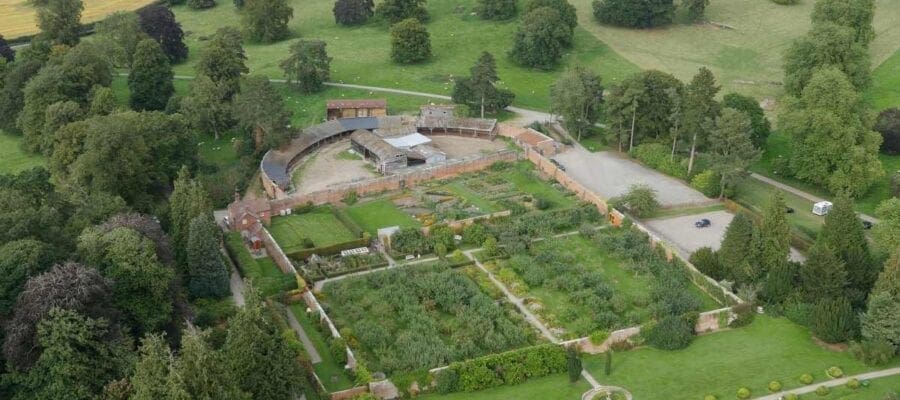- The National Trust’s Berrington Hall in Herefordshire has been awarded £269,000 from the £1.57bn Culture Recovery Fund for Heritage
- Money will help restore the only surviving ‘Capability’ Brown curved walled garden
- Specialist conservation work starts this week and will continue until March 2021
A grant from the Government’s £1.57bn Culture Recovery Fund for Heritage has thrown a lifeline to a project to restore the only surviving ‘Capability’ Brown curved walled garden, at the National Trust’s Berrington Hall in Herefordshire.
The project had been at risk of delay due to the financial impact of the coronavirus pandemic on the conservation charity, but a £269,000 grant from the Culture Recovery Fund has ensured work can continue to restore and conserve this rare survivor of Georgian garden design.
Berrington Hall [1] near Leominster sits within the last garden and landscape to be designed by the renowned 18th century landscape architect, ‘Capability’ Brown [2]. For over a century the unique Grade 2 listed curved walled garden, built in 1783, has been used to house livestock and is now in need of significant restoration to return it to its original glory.
The first stage of the project was to remove the agricultural buildings which were causing damage to the wall. Now specialist work to preserve the original 18th-century bricks and return the space to a garden will begin, with conservation work expected to be complete in March 2021.
Ana Vaughan, National Trust Operations Manager at Berrington Hall, said: “We are delighted to receive this funding from the Culture Recovery Fund. Together with money donated by our supporters, it means we can save ‘Capability’ Brown’s final curved walled garden, which is the only one of its kind to survive the centuries intact. We’re at the beginning of the journey to reimagining ‘Capability’ Brown’s vision for visitors and future generations to enjoy.”
This vital funding is from the Culture Recovery Fund for Heritageand the Heritage Stimulus Fund – funded by Government and administered at arm’s length by Historic England and the National Lottery Heritage Fund. Both funds are part of the Government’s £1.57 billion Culture Recovery Fund which is designed to secure the future of Britain’s museums, galleries, theatres, independent cinemas, heritage sites and music venues with emergency grants and loans.
Culture Secretary Oliver Dowden said:
“As a nation it is essential that we preserve our heritage and celebrate and learn from our past. This massive support package will protect our shared heritage for future generations, save jobs and help us prepare for a cultural bounce-back post Covid.”
Ingrid Samuel, Historic Environment Director for the National Trust said:
“This Government funding means the National Trust can reinvigorate its conservation programme for 2020, to deliver priority projects across the country.
“Like many others, the National Trust has been hard hit by the effects of the coronavirus, which has resulted in difficult decisions to scale back or even stop much-needed and long-planned conservation work at many of our places. Over the next six months, this money will make a significant impact. It will support urgent conservation activity at a wide range of heritage sites that the Trust looks after for the nation, from much loved landmarks like the Wellington Monument in the South West to the internationally important Tudor Hardwick Hall in the Midlands which in turn bring benefits to their local communities.
“We rely on our members and supporters to help us look after these important and much-loved places. We are very grateful to DCMS for supporting these projects which will bring real benefits across the country and be felt, not just at our places, but by the conservation partners and professionals we work with and the communities who live nearby.”
Duncan Wilson, Historic England’s Chief Executive said:
“It is heartening to see grants, both large and small, from the Government’s Culture Recovery Fund helping heritage sites and organisations across the country which have been hit hard by the effects of Covid-19. These grants range from giving skilled craft workers the chance to keep their trades alive to helping heritage organisations pay the bills, and to kick-starting repair works at our best-loved historic sites. The funding is an essential lifeline for our heritage and the people who work tirelessly to conserve it for us all, so that we can hand it on to future generations.”
Ros Kerslake, Chief Executive of the National Lottery Heritage Fund said:
“It is absolutely right that investing in heritage should be a priority during this crisis and this support by Government is crucial. Heritage creates jobs and economic prosperity, is a major driver for tourism and makes our towns, cities, and rural areas better places to live. All of this is so important for our wellbeing and will be particularly vital when we start to emerge from this incredibly difficult time.
“Our heritage is still facing a perilous future – we are not out of the woods yet. But this hugely welcome funding from Government, and the money we continue to invest from the National Lottery, has undoubtedly stopped heritage and the organisations that care for it being permanently lost.”





